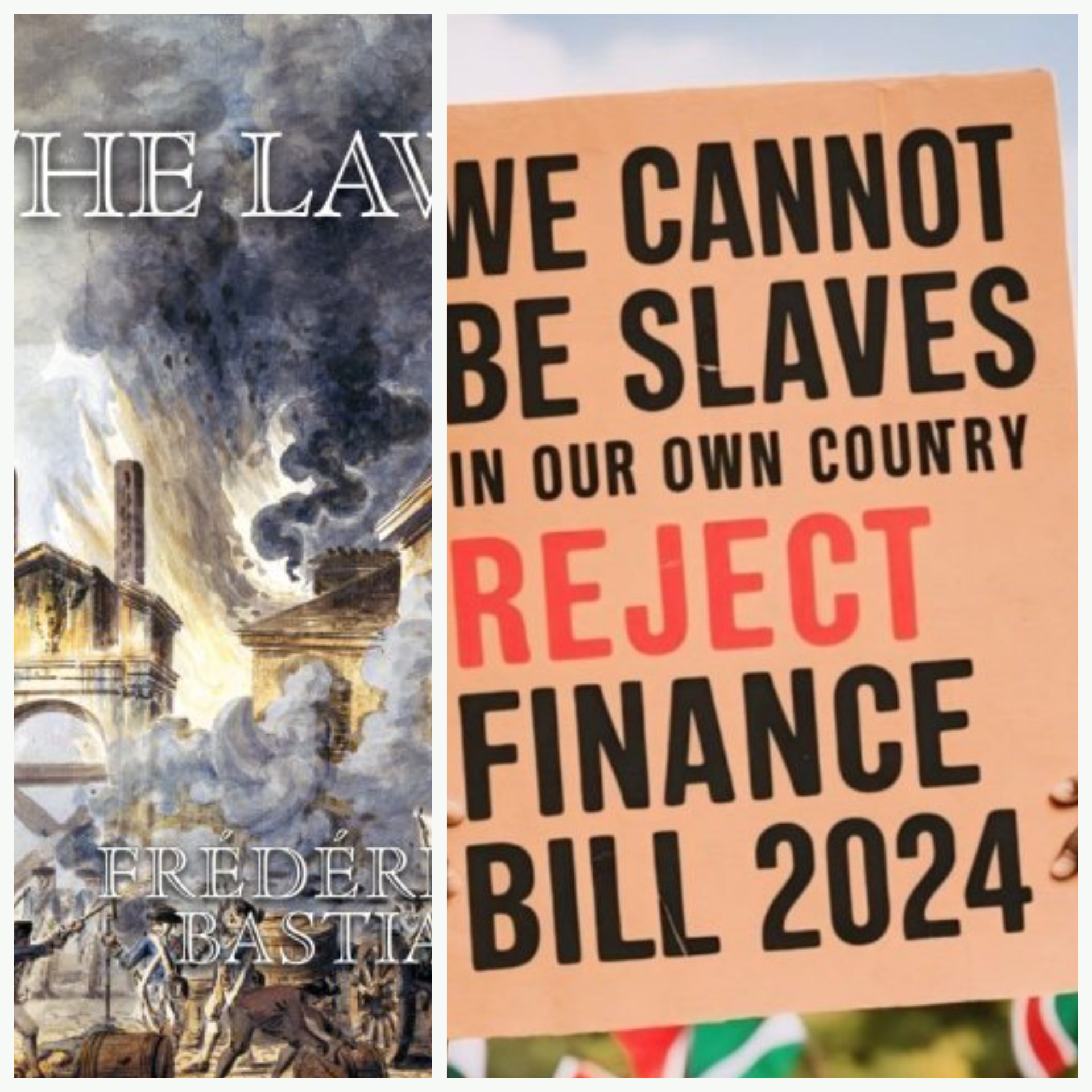
The Finance Bill 2024 and Legal Plunder: An Ode to Frédéric Bastiat’s ‘the Law’
The last two weeks have seen major protests in several towns in Kenya against the Finance Bill 2024. The Finance Bill 2024 was intended to amend several Acts to allow the government to levy more taxes in line with the government’s proposed budget for Financial Year 2024-25. Finance Acts are enacted each year following each financial year’s budget. The national budget is a statement of revenue and expenditure of the government each financial year. The budget is equally a statement of the government’s economic growth targets and how it expects to meet such targets.
The government also presents an Appropriation Bill for legislative approval allowing the government to draw money to finance its operations. While an Appropriation Act is mandatory for the government to be able to draw funds from the Consolidated Fund to finance its operations, a Finance Act is not. Finance Acts amend existing revenue laws, such as the Income Tax Act, Value Added Tax Act, etc., to allow the government to effect tax increases.
An unfortunate feature of economic life in Kenya has been that subsequent to each budget, a Finance Act is prepared amending the taxation regime, often to introduce new taxes to fund the government’s ever-increasing appetite for money. The government doesn’t have money of its own; it must tax its citizens, or borrow to raise money for its use. And this is the crux of the matter that brought matters to a head for the government. The Finance Bill 2024 contained a raft of new taxation measures that would impose a heavier burden on citizens. The government sought to levy more taxes, among them 16% value added tax on bread, motor vehicle tax at 2.5% of the value of the vehicle with a cap at Kes 100,000, a new tax on digital products and services, an eco-levy tax for environmental protection, to increase excise taxes on financial services, among others.
In the public participation process which is a mandatory requirement before any legislative enactment, it became increasingly apparent that the government’s tax proposals were unpopular. However, the government insisted on the new measures to raise more revenue. A common denominator in history, however, has been that when pushed to the limits, people will fight back, and push back against any measures beyond the public’s capacity to tolerate such measures. This has held whether it was the American or French Revolutions, pushback against colonial rule, apartheid in South Africa, or the Arab Spring.
It matters not that the government imposes a veneer of legality to its measures, by passing the law procedurally in Parliament. The law must be seen to fair, and reasonable. In 1850, French statesman and economist, Frédéric Bastiat, published the Law (in French, ‘la Loi’). Bastiat explained the law as ‘the organisation of the natural right of lawful defence.’ In other words, the law ‘is a common force, in substitution of individual force in the service of the defence of the protection of individual liberty and property, to maintain the right of each individual, and to cause justice to reign over all.’
Unfortunately, however, Bastiat noted, that the ‘law by no means confines itself to its proper functions. And when it has exceeded its proper functions, it has not done so merely in some inconsequential and debatable matters. The law has gone further than this; it has acted in direct opposition to its own purpose. The law has been used to destroy its own objective: it has been applied to annihilating the justice that it was supposed to maintain; to limiting and destroying rights which its real purpose was to protect. The law has placed the collective force at the disposal of the unscrupulous who wish, without risk, to exploit the person, liberty, and property of others.’ Bastiat coined a term, ‘legal plunder’, to explain this state of affairs where the law is employed to plunder the rights and property of citizens. Legal plunder is precisely what the Finance Bill 2024 sought to visit on Kenyans.
No one can reasonably argue against the government’s levying of reasonable levels of taxation to provide public goods, like security, maintain public infrastructure, healthcare, education, and the like. What a majority of Kenyans, and in particular, the younger generation commonly referred to as Generation Z (‘Gen Zee’) found abhorrent was that the tax hikes were way beyond what is reasonably tolerable; this, is a country whose government is known for corruption, profligacy, and misuse and abuse of public funds. And the citizenry drew the line. And true to the lesson of history, rebelled.
Unfortunately, the police responded with heavy and unwarranted force, including the use of live firearms against what were largely unarmed protesters, simply exercising their right to protest legal plunder. Ugly scenes which included the burning of part of Parliament buildings, and City Hall, were witnessed in response to the overreaction by the police. A gazette notice, of doubtful constitutionality, was published by the Minister for Defence authorising the military to assist the police in restoring order. The order was challenged in court and allowed to remain temporarily in force for two days while the government justified its continued enforcement.
President William Ruto announced the ‘withdrawal’ of the Finance Bill, sending it back to Parliament, which had earlier passed the Bill in flagrant disregard at widespread public displeasure with the Bill, asking Parliament to delete all the clauses. Again, this is of doubtful constitutionality, given that once a Bill is passed, the president has no power to withdraw it. The Speaker of the National Assembly published an explainer, stating that the Bill was ‘lost’ upon approval of the President’s reservations. For any clause of the Bill to be revived, a Member of Parliament will need to marshal a two-thirds majority to succeed. For whatever it is worth, this seems to be an academic debate, and the Bill is unlikely to see the light of day.
When Bastiat wrote ‘The Law’, he probably did not expect, even less so, intend, it to be a classic. But it lives on. Legal plunder in whatever form must be resisted. And it must always be remembered that government is an agent of the people, and it can only govern with the consent of the governed. In a constitutional democracy, the government must listen to its people, and not forget that its primary purpose is to protect its citizens’ life, liberty, and property, and not plunder the citizens. This lesson was delivered loudly and clearly by Kenyans in response to extortionate and draconian tax measures.
